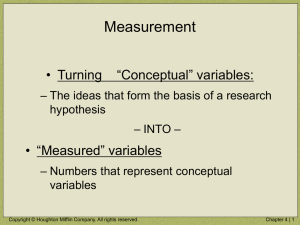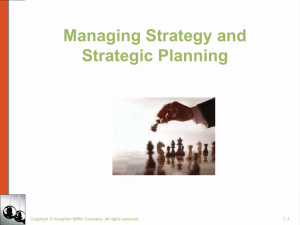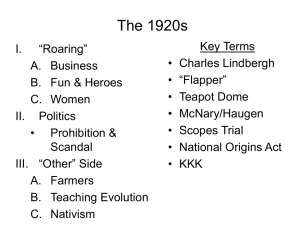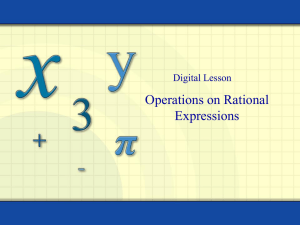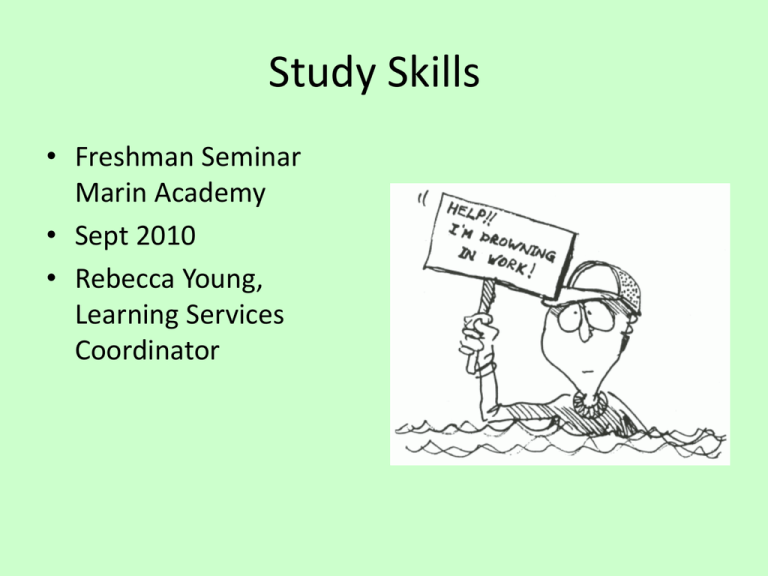
Study Skills
• Freshman Seminar
Marin Academy
• Sept 2010
• Rebecca Young,
Learning Services
Coordinator
Outline
•
•
•
•
Skill 1: Listening
Skill 2: Studying
Skill 3: Tests
Skill 4: Long term
projects
Skill 1: Listening
Listening vs. Hearing: What’s the
Difference?
Listening vs. Hearing
Listening involves understanding what you are hearing
and having the ability to hold verbal stimuli in
working memory long enough to attach meaning to
the words and to interpret what the speaker is
saying.
Listening is not the same as hearing.
Listening is an active process.
Copyright © Houghton Mifflin
Company. All rights reserved.
10 - 5
What Factors Influence Your Ability
to Listen in Class?
•
•
•
•
•
Your attitude
The topic
The speaker's qualities
External distractors
Personal factors
Copyright © Houghton Mifflin Company. All
rights reserved.
10 - 6
Strategies for Active Listening
•
•
•
•
Familiarize yourself with the topic before class. HOW?
Prepare questions about the topic BEFORE class.
Relax.
Focus on the speaker's message by using verbal and
nonverbal clues. What does this mean?
• Listen carefully in group activities and be open to other
points of view.
• Ask clarifying questions, paraphrase, and respond to
questions.
• TRY to concentrate. Play with a stress ball if that helps, get
up and get a drink if you lose focus, walk around the room (if
that is okay with your teacher).
Copyright © Houghton Mifflin
Company. All rights reserved.
10 - 7
While you are Listening: Techniques for Organizing
Information so you can Take Good Notes
1. Have paper (spiral notebook?) out when notes are
coming, label date, be ready
2. Listen for key words and main points.
3. Listen for vocabulary and definitions.
3. Listen for important details.
5. Listen for examples.
6. Use verbal and nonverbal clues as signals of
importance.
7. Copy steps and explanations for math problems.
Copyright © Houghton Mifflin
Company. All rights reserved.
10 - 8
Working With Your Class Notes AFTER
Class
• Check with a friend – or the teacher or book – for
anything you might have missed; you can ALWAYS go
to tutorial and ask the teacher to review your notes.
• Add more structure/organization to your notes.
• Supplement your notes.
• Rewrite your notes when justified.
• Recite, reflect, and review your notes.
Copyright © Houghton Mifflin
Company. All rights reserved.
10 - 9
SKILL #2: Studying
Time Management
• What are some strategies you use to manage your time?
• Distributive learning: Use small chunks of time throughout
the day to get things done rather than saving up for one big
chunk.
What Constitutes a Good Study Area?
1. The noise level is conducive to studying
2. The lighting is good
3. Get everything you need before you start-are
you hungry?
4. The work space promotes concentration
Copyright © Houghton Mifflin
Company. All rights reserved.
5- 12
An essential part of Studying: Memory
“The true art of memory is the art of attention.”
… Samuel Johnson
The Twelve Principles of Memory
Copyright © Houghton Mifflin
Company. All rights reserved.
2 - 14
Characteristics of the Twelve
Principles of Memory
Copyright © Houghton Mifflin
Company. All rights reserved.
2 - 15
Characteristics of the Twelve
Principles of Memory
Copyright © Houghton Mifflin
Company. All rights reserved.
2 - 16
Characteristics of the Twelve
Principles of Memory
Copyright © Houghton Mifflin
Company. All rights reserved.
2 - 17
Use the Mnemonic SAVE CRIB FOTO
a mnemonic can help trigger a word and then the rest will come….
What are the Twelve Principles of Memory?
S
A
C
V
R
E
I
B
Copyright © Houghton Mifflin
Company. All rights reserved.
2 - 18
F
O
T
O
Skill 3 TESTS
Studying for a test: Tips
• Get everything you need before you start
• Try to anticipate the kinds of questions you’ll
be asked
• Make a written schedule and a plan: ½ hour
for 3 days leading up to test? during tutorial
the week before? With a friend the afternoon
before?
• Teach the material to someone
• Give yourself a reward after 30 minutes?
Skill 4: Term-Long Projects
•
•
•
•
Break the assignment into specific tasks.
Estimate the time needed for each task.
Double the estimated time for each task.
Record the due dates on your term calendar
for each task.
• Begin right away.
Copyright © Houghton Mifflin
Company. All rights reserved.
4 - 21
• “Learning is not a spectator sport. You do not
learn much just by sitting in class listening to
teachers, memorizing prepackaged assignments
and spitting out answers. You must talk about
what you are learning, write about it, relate it to
past experiences and apply it to your daily lives.
You must make what you learn a part of yourself
and your life.”
• Come see me whenever I can help you with these
skills.
QUIZ. A volunteer please?
•
•
•
•
1. What are the 4 skills we talked about?
2. What is a mnemonic?
3. What does SAVE CRIB FOTO stand for?
4. Name one outing you are going on this
semester.
• 5. What is one you learned that you might try to
implement in your classes/ studying?
• 6. What do you think is your most challenging
class that is going to teach you the most this
year?







